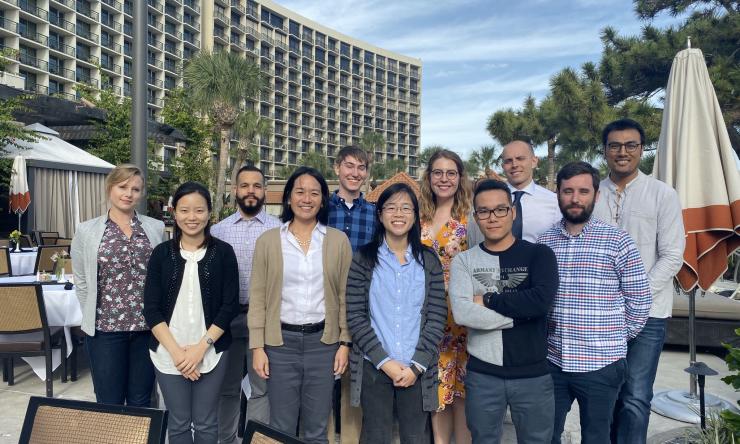
Lab Members
The Katherine King lab members are involved in the study of the role of interferon-gamma in hematopoietic stem cell regulation.
 Credit
Credit
AAMDISF Grantee Interview
Dr. King discusses the impact of receiving an AAMDSIF research grant on her career and her study of bone marrow failure. Her research on the effects of inflammatory signaling on bone marrow stem cells may lead to novel ways to interrupt the development of aplastic anemia.
About the Lab
Bone marrow suppression and pancytopenia can result from chronic inflammation. Bone marrow suppression is a risk factor for increased mortality for patients with chronic infections and aplastic anemia. However, very little is known about the mechanisms by which inflammatory cytokines affect the hematopoietic progenitors that reside in bone marrow.
Discovery
Hematopoietic stem cells (HSCs) are the precursors of all cells of the peripheral blood, and they usually reside in a quiescent state in the bone marrow. We discovered that interferon gamma (IFNγ) promotes hematopoietic stem cell (HSC) division and myeloid differentiation in a mouse model of Mycobacterium avium infection (Nature 2010). Furthermore, basal inflammatory signaling mediated through the intestinal microbiome is required to maintain normal blood homeostasis (Blood, 2017).
While responses to inflammation may be necessary to maintain normal and emergency hematopoiesis, it may be deleterious over the long term, with prolonged inflammation leading to stem cell exhaustion (Cell Reports, 2016). We recently demonstrated that the cell surface expressed protein BST2 is a critical mediator of IFNγ-dependent HSC activation, and deletion of BST2 can help preserve HSCs in the setting of chronic infection (Cell Reports, 2020). We have also discovered that infection can be a driver of Dnmt3a-loss of function clonal hematopoiesis, and defined the transcriptional and epigenetic mechanisms underlying the Dnmt3a-loss of function clonal selection advantage in the setting of chronic inflammation. (Cell Stem Cell 2021)
Ongoing Research
Ongoing work is focused on defining molecular pathways underlying inflammation-mediated transcriptional and epigenetic regulation of HSCs. This knowledge is a key to understanding the pathophysiology of bone marrow failure syndromes and will likely provide novel targets for drug development. Furthermore, this work may elucidate how inflammatory signals affect the pattern of HSC differentiation and, in turn, downstream immune responses, as well as how infections can contribute to aging and oncogenesis.
See a list and descriptions of our current projects.









